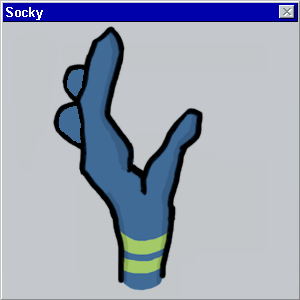I want you 2nd century bastards off my exquisite Roman lawns!
March 25, 2008 9:28 AM Subscribe
How do you say "Damn kids, get off my lawn!" in Latin?
I'm envisioning this as a motto around a seal, much like Lux et Veritas, etc. The best I can come up with is evado meus hortus, scelerata ("get out of my garden, miscreants") or evado meus gramen ("get off my grass"), but this sounds stilted, and I probably have the case and tenses wrong. I'm sure the hive-mind, well-versed as it is in antiquities, can do better. Please help me dispatch Caesar's worthless brood!
I'm envisioning this as a motto around a seal, much like Lux et Veritas, etc. The best I can come up with is evado meus hortus, scelerata ("get out of my garden, miscreants") or evado meus gramen ("get off my grass"), but this sounds stilted, and I probably have the case and tenses wrong. I'm sure the hive-mind, well-versed as it is in antiquities, can do better. Please help me dispatch Caesar's worthless brood!
Response by poster: More literal. I don't want an equivalent Latin idiom that communicates the same idea. But I suppose it would be okay to be flexible with the English phrase ("Make your exit from these my gardens, wretched children") if that simplifies the translation, or makes it sound more portentous.
posted by Pastabagel at 10:51 AM on March 25, 2008
posted by Pastabagel at 10:51 AM on March 25, 2008
Hmm, well the examples you provide are longer than they need be by a "meus" apiece (make the lawn your own by putting it in genitive), and the verbs need to be made imperative plural. Thus, I think your examples might be properly phrased as "Evadete horti, scleratae!" or "Evadete graminis!" It's been a while, though. I'm not sure just how Latin mottos are going to sound not-stilted... is it the number of syllables? Evadete graminis sounds pretty snappy to me.
posted by mumkin at 11:53 AM on March 25, 2008
posted by mumkin at 11:53 AM on March 25, 2008
Vos vehete hortibus meis, liberi scelerati!
Where...
vos = reflexive pronoun
vehete = transfer, imperative (giving an order)
hortibus = masculine ablative plural (away from the gardens)
meis = agrees with hortibus (away from *my* gardens)
liberi = 'children', vocative, neutral (I think)
scelerata = an adjective, agrees with children
So literally, 'Remove yourselves from my gardens, miscreant children.'
Feel free to correct it...
posted by randomination at 12:00 PM on March 25, 2008
Where...
vos = reflexive pronoun
vehete = transfer, imperative (giving an order)
hortibus = masculine ablative plural (away from the gardens)
meis = agrees with hortibus (away from *my* gardens)
liberi = 'children', vocative, neutral (I think)
scelerata = an adjective, agrees with children
So literally, 'Remove yourselves from my gardens, miscreant children.'
Feel free to correct it...
posted by randomination at 12:00 PM on March 25, 2008
Oh buggery, the damned gardens do need to be ablative and all that. Time, it disconnects the synapses :( Nice alliteration with the vos vehete there... In alternate phrasing I was thinking of working the decamp angle, with decedo, decedesse as the verb, and campus for the lawn/field. Do you think liberi is right for kids? I was thinking maybe iuvenci, casting the lawn-squatters as more teenaged hooligans than wee urchins.
posted by mumkin at 12:23 PM on March 25, 2008
posted by mumkin at 12:23 PM on March 25, 2008
Decedere also means 'to die' according to my dictionary (it's where the word 'deceased' comes from). Saying 'decedite' might be a bit harsh ;)
You could use 'pueri' I suppose instead of liberi, that just means 'boys', that would be
Vos vehete hortibus meis, pueri scelerati
I messed up the original, should be
Vos vehite hortibus meis, liberi scelerata
I have to go to the supermarket now.
posted by randomination at 12:40 PM on March 25, 2008
You could use 'pueri' I suppose instead of liberi, that just means 'boys', that would be
Vos vehete hortibus meis, pueri scelerati
I messed up the original, should be
Vos vehite hortibus meis, liberi scelerata
I have to go to the supermarket now.
posted by randomination at 12:40 PM on March 25, 2008
I think you want abfugio or abito as your base verb. Is there a diminutive version of damnatitia you could use for "damned kids"? damnatitiola?
posted by tew at 12:44 PM on March 25, 2008
posted by tew at 12:44 PM on March 25, 2008
Best answer: Abito! Yes that's the word.
Abitate hortibus meis, pueri scelerati!
That's got enough harsh constanants in to really spit out. You might even get that to scan in iambs, the first part at least.
I think 'Damnaticius' means 'sentenced or condemned', you could use it like
Abitate hortibus meis, pueri damnaticii
Campus is a battlefield or other level field.
Handy Latin dictionary textfile I'm working from
posted by randomination at 2:24 PM on March 25, 2008
Abitate hortibus meis, pueri scelerati!
That's got enough harsh constanants in to really spit out. You might even get that to scan in iambs, the first part at least.
I think 'Damnaticius' means 'sentenced or condemned', you could use it like
Abitate hortibus meis, pueri damnaticii
Campus is a battlefield or other level field.
Handy Latin dictionary textfile I'm working from
posted by randomination at 2:24 PM on March 25, 2008
Quidquid latine dictum sit, altum viditur
posted by thewalrusispaul at 3:45 PM on March 25, 2008
posted by thewalrusispaul at 3:45 PM on March 25, 2008
Saying 'decedite' might be a bit harsh
Actually I kinda liked it for exactly the FOAD undercurrent it has.
posted by mumkin at 5:20 PM on March 25, 2008
Actually I kinda liked it for exactly the FOAD undercurrent it has.
posted by mumkin at 5:20 PM on March 25, 2008
Good point, then if you want to do that I'd suggest...
decedite a hortibus meis, pueri scelerati
...putting in the preposition 'a' = 'away from' just to make it clear that the verb means leave, rather than die, otherwise the phrase could be translated 'Die in my gardens, miscreant boys'
Quidquid latine dictum sit, altum viditur
Ave. Nomen mihi Inigo Montoya est. Patrem mihi necavisti. Para perire.
posted by randomination at 3:26 AM on March 26, 2008 [1 favorite]
decedite a hortibus meis, pueri scelerati
...putting in the preposition 'a' = 'away from' just to make it clear that the verb means leave, rather than die, otherwise the phrase could be translated 'Die in my gardens, miscreant boys'
Quidquid latine dictum sit, altum viditur
Ave. Nomen mihi Inigo Montoya est. Patrem mihi necavisti. Para perire.
posted by randomination at 3:26 AM on March 26, 2008 [1 favorite]
Best answer: Erratum - I forgot ire was irregular, so the correct form should be
"abite hortibus meis pueri scelerati"
posted by randomination at 4:50 AM on March 26, 2008 [1 favorite]
"abite hortibus meis pueri scelerati"
posted by randomination at 4:50 AM on March 26, 2008 [1 favorite]
Response by poster: I'm going with "Abite hortibus meis iuvenci scelerati" if it gets everyone's approval.
posted by Pastabagel at 1:27 PM on March 26, 2008 [3 favorites]
posted by Pastabagel at 1:27 PM on March 26, 2008 [3 favorites]
Yep looks good.
posted by randomination at 4:17 PM on March 26, 2008
posted by randomination at 4:17 PM on March 26, 2008
You're declining "hortus" wrong. Should be "abite hortis" not "hortibus" I think.
posted by grobstein at 3:17 PM on August 5, 2008
posted by grobstein at 3:17 PM on August 5, 2008
no, hortibus is correct. Hortus (with a long u) is fourth declension, not second, and hortibus is the ablative plural.
posted by randomination at 9:23 AM on September 19, 2008
posted by randomination at 9:23 AM on September 19, 2008
This thread is closed to new comments.


posted by mumkin at 10:32 AM on March 25, 2008 [1 favorite]